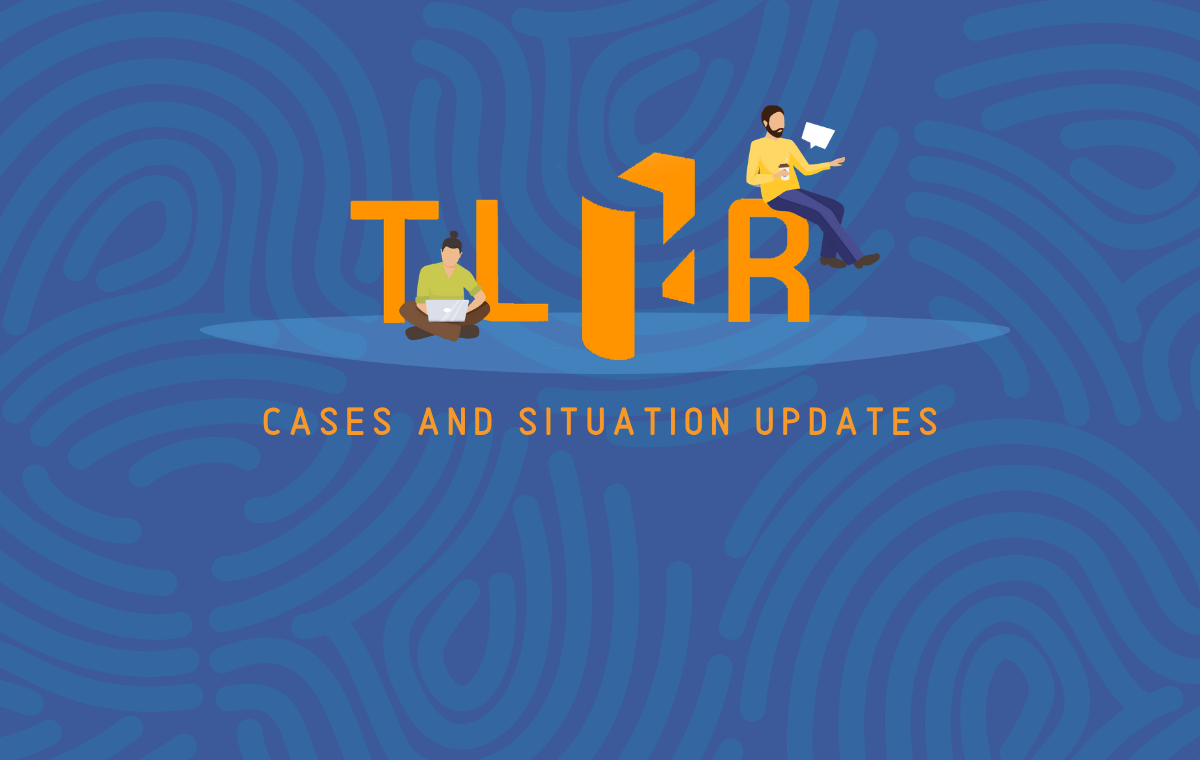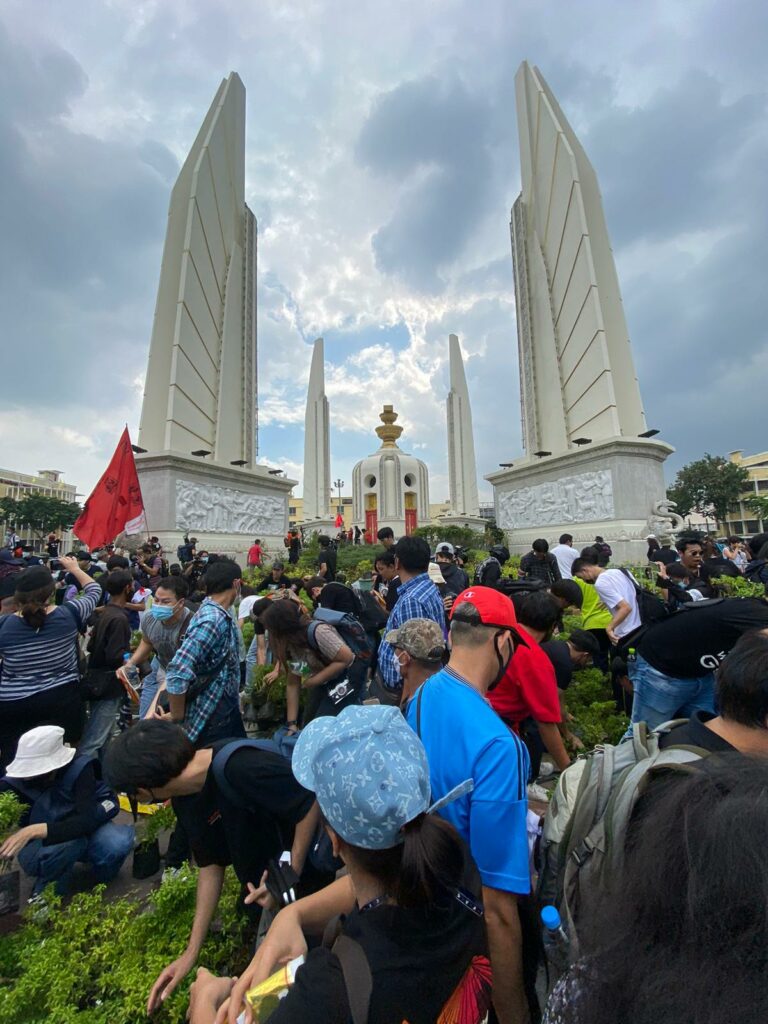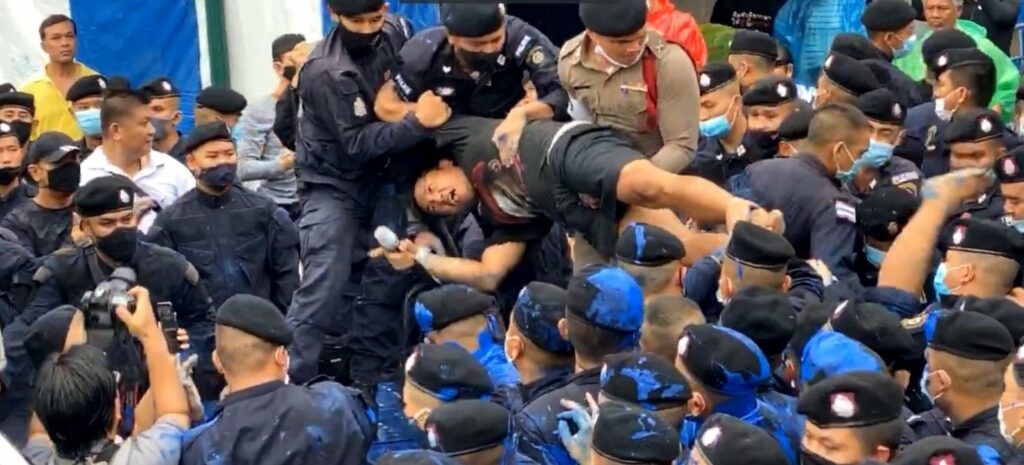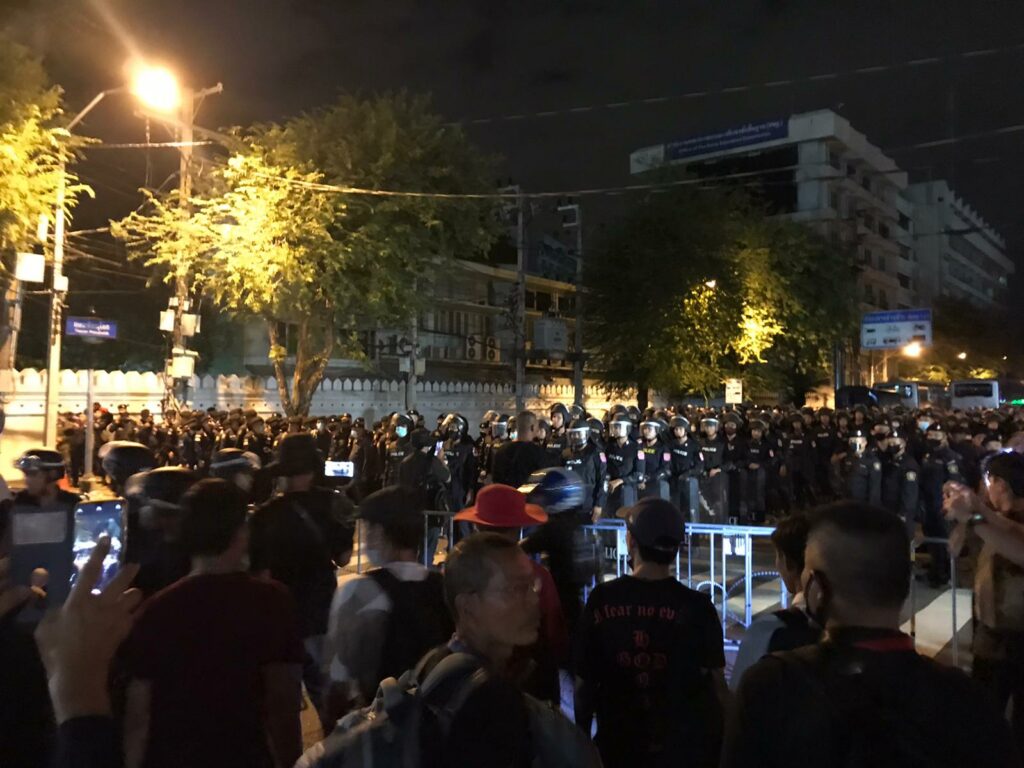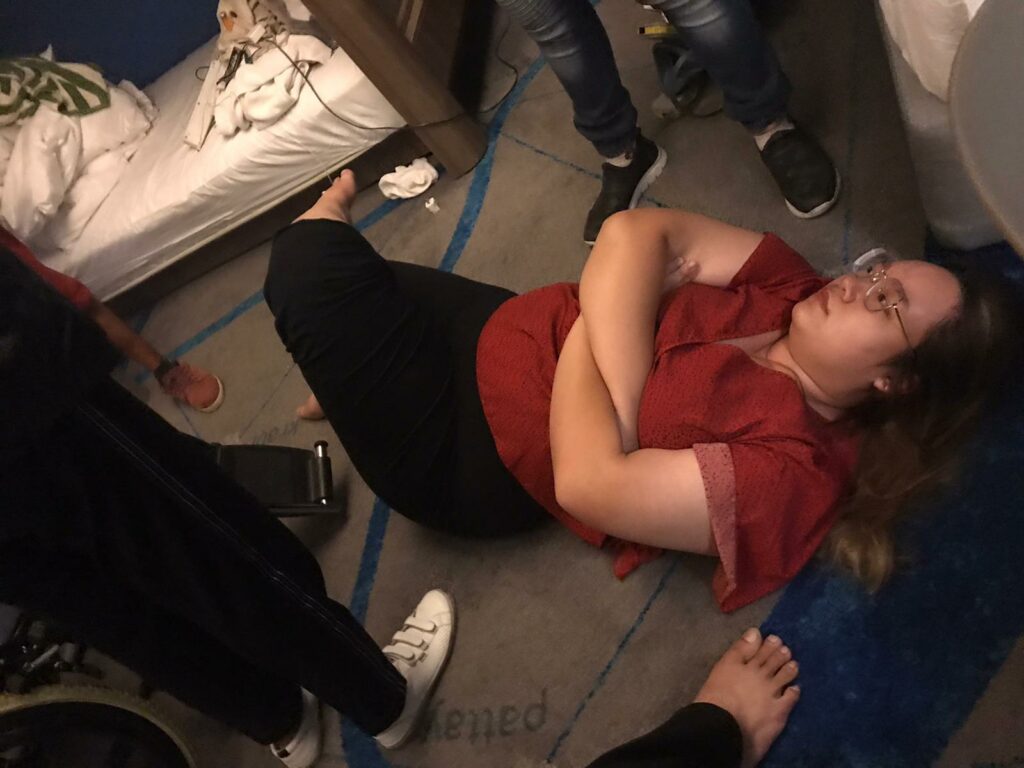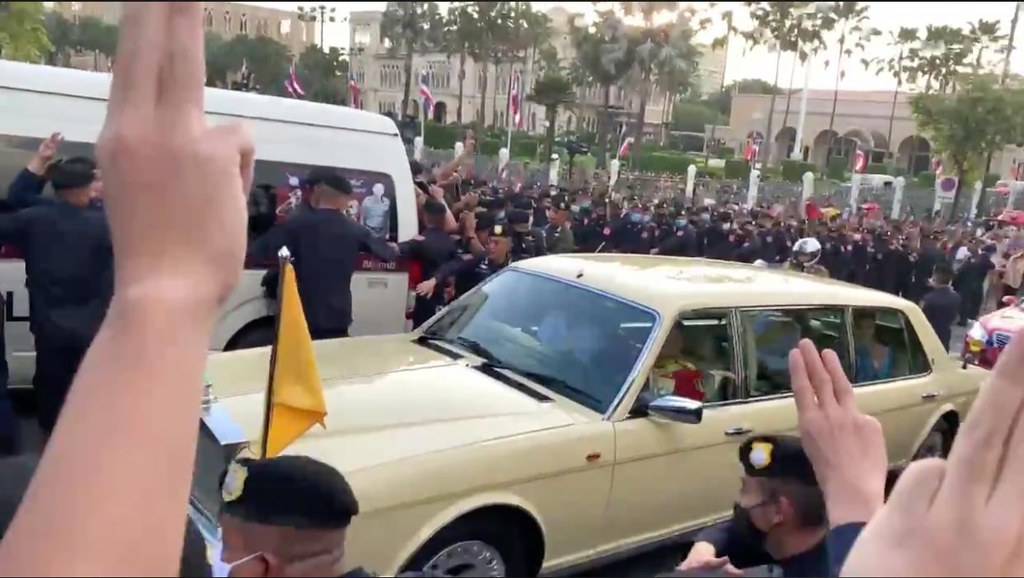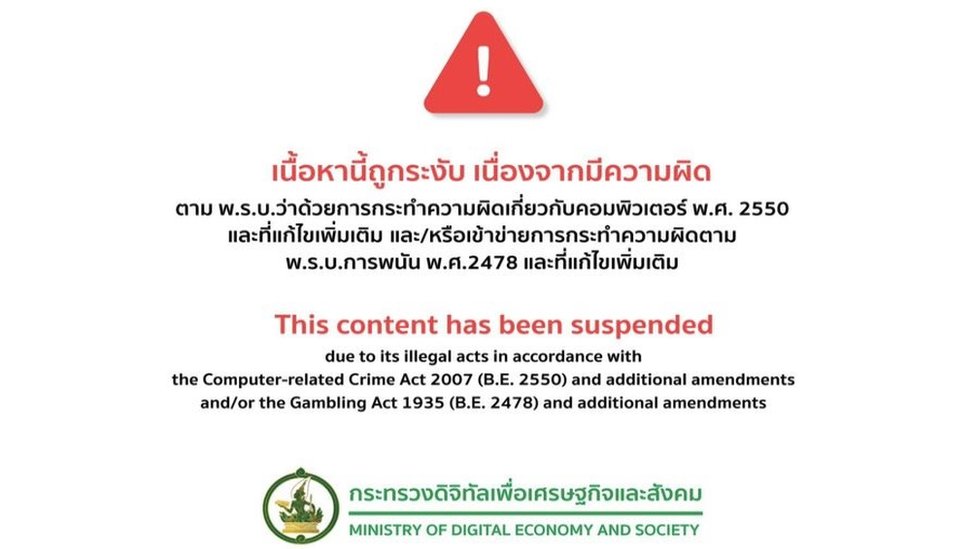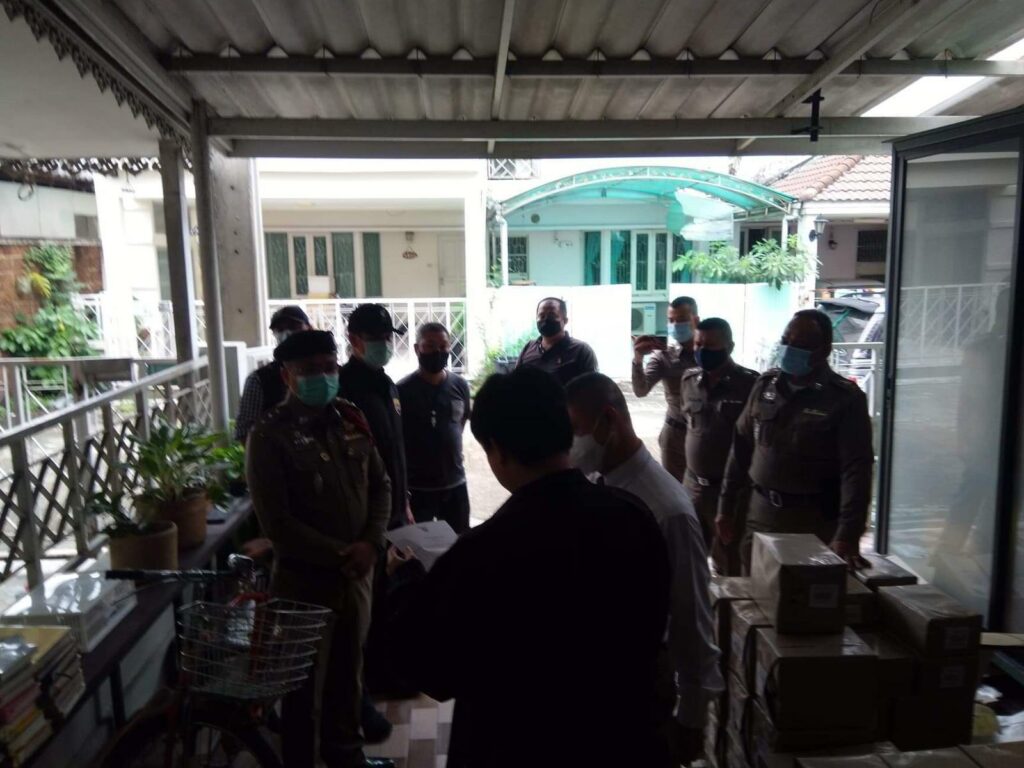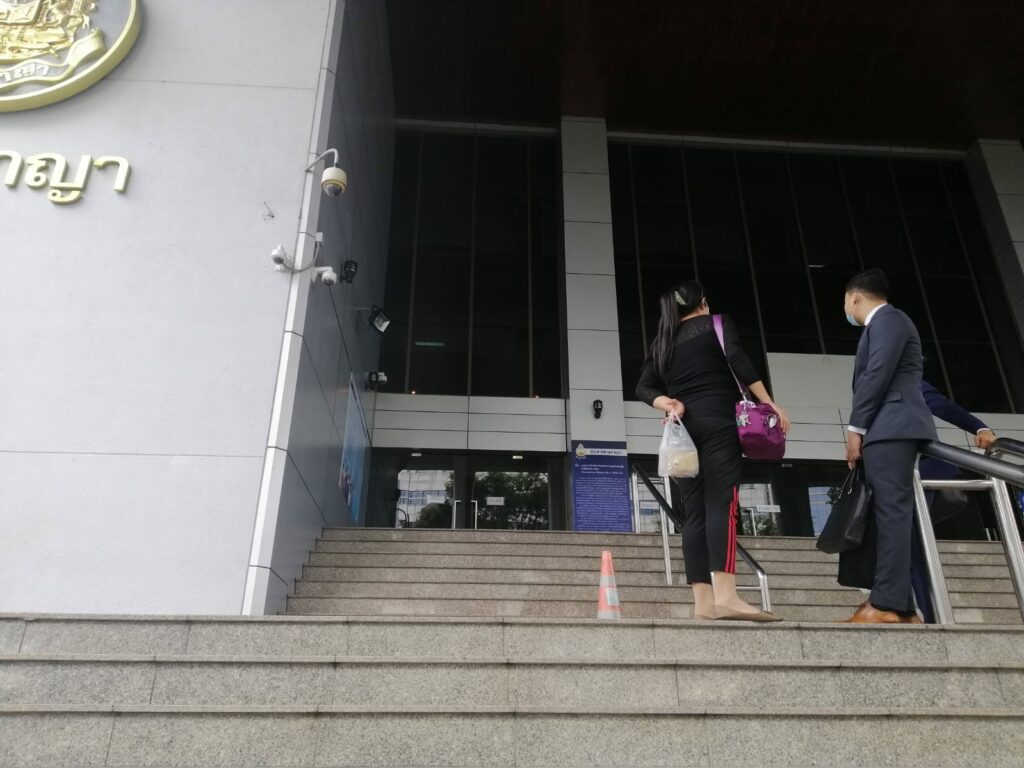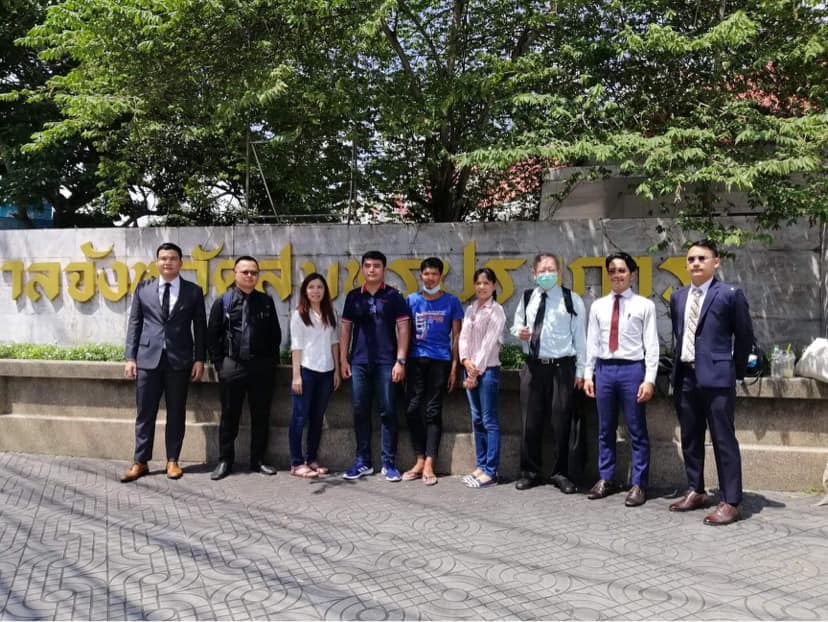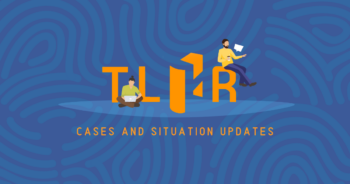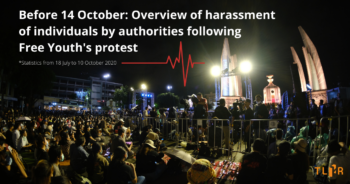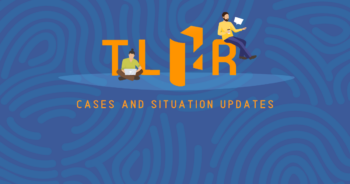Summary
In October 2020, Thai Lawyers for Human Rights (TLHR) documented 54 cases and incidents of human rights violations in central and southern Thailand – Bangkok, Pathum Thani, Nonthaburi, Samutprakan, Chonburi, Saraburi, and related to Nakhon Si Thammarat and Pattani. These include 5 cases of arbitrary detention, 6 cases of restriction of freedom of expression, 6 cases of restriction of freedom of assembly, 31 cases of court observation and monitoring, and 6 cases of other forms of harassment and intimidation.
In northeastern Thailand, TLHR documented at least 35 cases of incidents of human rights violations – Ubon Ratchathani, Khon Kaen, Maha Sarakham, Nakhon Panom, Roi Et, Sisaket, Sakon Nakorn, Udon Thani, Chaiyaphum, Loei, Kalasin, and Amnat Charoen. These include 11 cases of restriction of freedom of assembly, 5 cases of restriction of freedom of expression, 7 cases of court observation and monitoring, and 6 cases of harassment and intimidation and others.
In northern Thailand, TLHR monitored 13 cases and incidents of human rights violations –Lamphun, Lampang, Payao, Petchabun, Tak, and Chiang Mai. These include 1 case of restriction of freedom of expression, 9 cases of court observation and monitoring, and 3 cases of harassment and intimidation and others.
| Human rights situation amidst the Covid-19 pandemic Ø Government extended the Emergency Decree for another month, after 7 months in effect, and used it to restrict the freedom of assembly. On 29 Oct 2020, the Royal Gazette announced the 7th nationwide extension of the Emergency Decree from 1-30 Nov after its issuance on 26 Mar 2020. The government claimed that the Covid-19 situation remained serious, as the number of global infections continued to rise and some neighboring countries experienced an expansive outbreak. People still continuously sneaked into the Kingdom illegally through natural channels and foreigners from the said neighboring countries were tested positive for Covid-19, which would likely lead to cluster infections. Moreover, the public health data suggested that the virus had undergone mutation, while the development of vaccine and medicine against it was yet to yield any results. In October, two members of a community in Tak province, along with three other people who had a close contact with an earlier confirmed patient, were tested positive, while in Surat Thani one French woman was also found sick, with unclear origin of infection. Regarding the extension of the special law, the spokesperson of the CCSA, in line with the government, stressed that the announcement of the state of emergency was to control the pandemic, and not political. That said, TLHR witnessed the opposite in the enforcement. The police still repeatedly used offences under the Emergency Decree with the student-led protests. In October, apart from the declaration of the state of severe emergency between 15-22 October to directly control the people’s protests, charges with violating the Emergency Decree, aimed for pandemic control, were also used to prosecute people in 9 additional cases for protests taking place in July up until 15 Oct. As a result, 29 new people were accused, and the total number of people accused of violating this clause due to their political participation during the Covid-19 pandemic rose to at least 103 people in 29 cases. |
- Overall human rights situation
- Gen Prayuth declared the state of severe emergency. State officials arrested at least 20 protest leaders and continuously prosecute people involving in protests.
In October, a group of students and citizens called “Kana Ratsadon” announced a big rally on 14 Oct 2020 at the Democracy Victory to march to the House of Government to hand their requests to Gen Prayuth Chan-Ocha calling for his resignation, a new constitution, and a monarchy reform.
Demonstration on 14 October 2020
On the morning of 15 October 2020 at 4 am, Gen Prayuth Chan-Ocha used his power under section 5 and 11 of the Emergency Decree to declare the state of severe emergency in Bangkok area, reasoning that some people had tried to incite violence and unrest and that the public gathering had caused disorder and chaos and potential harm towards the royal motorcade. Gen Prayuth also issued an order banning public gatherings of more than five people.
The said incidence led to an increased use of power by the state to control demonstrations. These included dispatching riot police to disperse the Kana Ratsadon rally on the morning of 15 Oct near the House of Government, using vehicles equipped with high-pressure water cannon to shoot chemical-mixed water at the protestors at the Pathum Wan Intersection in the evening of 16 Oct, arbitrarily arresting people, journalists, and students during the protests and detaining them at a place that was not a police station, delaying the right to meet lawyers, detaining protest leaders without granting right to bail, blocking roads for people and ambulances, closing public transportation facilities or buildings, suspending the work of some news agencies, blocking websites, etc. These actions affected the people’s right to freedom of assembly and expression, freedom of movement, as well as rights to disseminate and receive information.
Crackdown on Oct 14 rally at the dawn of Oct 15
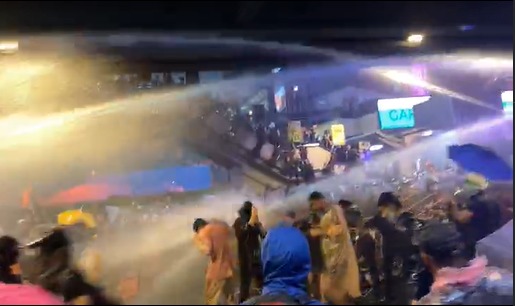
Crackdown on Oct 16 Rally
Thai Lawyers for Human Rights found that since the rallies by #KanaRatsadon from 13 to 22 Oct 2020 including during the state of severe emergency:
- At least 90 people were arrested/prosecuted, among which 10 were women, 78 were men, 2 were LGBTQ+, and among which 22 were university students, 1 was a high school student, 1 was youth, and 1 was mentally challenged.
- Among the 84 people prosecuted (6 were released without charges), 55 were brought to be detained at the Bureau of the Border Patrol Police Area 1 in Pathum Thani province to be informed of charges before being brought to the respective court to seek detention.
- 31 people including 4 women, 25 men, and 2 LGBTQ+ were detained during the police investigation at the Bangkok Remand Prison, Central Women’s Correctional Institution, Chiang Mai Central Prison, Thanyaburi District Prison, Pattaya Remand Prison, and Bang Kwang Central Prison. Later, all leaders and protestors were released on 2 Nov 2020.
Despite the arrests of protest leaders and citizens as well as two crackdowns, people still continued to go out on the street everyday without clear leadership. On 22 Oct, Gen Prayuth lifted the state of severe emergency, reasoning that the conflict had decreased and ended.
Meanwhile, the prosecution against protesters persisted. From 22 Oct to 4 Nov 2020, at least 74 warrants were issued to summon 54 people in 21 cases related to nationwide protests occurred since July until November.
The prosecution against prominent activists, i.e. Arnon Nampa, Parit Chiwarak, Panusaya Sithijirawattanakul, Panupong Jadnok, Jatupat Boonpattararaksa, was still observed in various cases. For this, arrest warrants based on protests since July were used retrospectively, especially with charges of section 116 of the Thai Criminal Code as a result of speeches about the monarchy. Consequently, at least 36 people were prosecuted in 11 cases in total towards the end of October.
Arrest of “Rung” Panasaya on Oct 15
From the abovementioned incidence, on 21 Oct 2020, students from Chulalongkorn University and Thammasat University, together with Thai Lawyers for Human Rights and others civil society organizations, submitted a request to the Civil Court to revoke the declaration of the state of emergency and all related announcements and orders, provide temporary protection, and to arrange for an urgent trial. On the following day, the Court rejected the request of an urgent trial and temporary protection because the state of severe emergency had already been lifted, while set up a time for a hearing in the afternoon of the same day.
- Comments and discussions about the monarchy continued vigorously amidst prosecution, harassment, and censorship.
In October, opinions, as well discussion and various forms of expression, related to the monarchy issues continued vigorously in parallel to the anti-government protests. At the same time, this was faced with an opposition from the royalist groups, who also mobilized state authorities to organize a protest with yellow shirts as a symbol. Moreover, the King Rama X returned to spend some time in Thailand during this month, leading to heightened risks of confrontation.
Royal Motorcade passing thorough the protest site on Oct 14
During this month, three activists were arrested and prosecuted for “obstructing the royal motorcade” with the queen and Prince Dipangkorn Rasmijoti in it, as on 14 Oct 2020, the royal motorcade passed through the protest site unannounced. Some people flashed a three-finger salute while shouting words of discontent, which prompted the Dusit police to request the Court to issue arrest warrants for Mr Boonkueanun Paotong, a 2nd year student from Mahidol University, Mr Ekkachai Hongkangwang, a political activists, and Mr Suranat Paentong, a community and child development activist for offences related to section 110 of the Penal Code “Whoever commits an act of violence against the Queen or Her liberty”. After the trio was informed of the charges, the Court granted bail for Mr Boonkueanun during investigation, while that of Mr Ekkachai and Suranat was denied. The two were detained until 2 Nov, when the Court rejected the inquiry officer’s request for detention.
On 16 Oct 2020, in Pattaya City, Chonburi Province, police made an arrest of Mr Sontaya (last name undisclosed), a 26-year-old Twitter user, who allegedly tweeted an image of a portrait of the King Rama X with insults painted underneath. The authorities had asked a warrant to be issued after the actual arrest and pressed charges with section 14 (3) of the Computer-related Crime Act “…import to a computer system of any computer data related with an offence against the Kingdom’s security”. The process was carried out without the presence of lawyer. Later, he was released on bail on 23 Oct 2020.
On 20 Oct 2020, Ms Panida (last name undisclosed), a 24-year-old sale assistant in Pattaya City, was also arrested for allegedly spraying insults underneath the King’s portrait. She was detained without a warrant, before being charged with section 360 of the Penal Code for damaging the public property. As the Pattaya Provincial had rejected the request for detention, Ms Panida was released during investigation.
In this month, it was also found that state authorities monitored at least 11 students who expressed opinions about the monarchy, particularly the two students who opposed the commencement ceremony at Thammasat University, the students who organized anti-royalist activities in the northeastern region, and the scholars and students who were active during the royal visit to attend the commencement ceremony in Sakon Nakorn province and the Buddhist Kathina ceremony in Ubon Ratchathani province.
Furthermore, the Ministry of Digital Economy and Society proceeded to block the access to a big number of websites in Thailand following the court order, particularly those containing monarchy-related content, for instance, Change.org, which was restricted after an individual had created a petition making the King a persona non grata, the Youtube video clip of Anon Nampa’s speech about the monarchy at the Thammasat rally on 10 Aug 2020, and Pornhub website, which was likely due to a monarchy-related clip.
Change.org blocked citing illegal acts due to Computer Crime Acts
In addition, on 19 Oct 2020, Rattanathibet police conducted a search at the office of Fa Diew Gan (Same Sky) Magazine, claiming that the press had put on sale 5 allegedly unlawful books containing insults against the monarchy and that the police had set up a committee to investigate the content.
Police Search at Samesky Magazine office
Key cases updates
- The Court gave a 6-month jail term for a Computer-related Crime Act case for post alleging Police Chief’s involvement in activists assault.
On 15 Oct 2020, the Criminal Court read the verdict in the case of Suchanan (last name undisclosed), who was charged with section 14 (2) of the Computer Crime Act for posting a statement that the police deputy chief and police officers of the Crime Suppression Division were behind the assault of the activists, including Sirawit Serithiwat, Anurak Jentawanit, and Ekkachai Hongkangwan, in July 2019. The Court ruled that the defendants were guilty and gave 6-month imprisonment without suspension, reasoning that the said statement undermined the people’s trust towards the police, who had the duty to protect the citizens’ safety, and if the people saw that the Police Headquarter and high-ranking commanders who oversaw the headquarter operation were involved in attacking dissidents, they would become defiant causing public instability. The defendant was granted bail and decided to appeal later.
- The Court acquitted the section 116-criminal organization-CCA case of 6 defendants related to the “Thai Federation” who wore black shirts and raised banners in front of MBK.
On 19 Oct 2020, the Criminal Court read the verdict for the case involving 6 individuals who raised Thai Federation banners in front of MBK Department Store on 5 Dec 2020. All of them were charged with sedition according to section 116 of the Penal Code, being a member of a criminal organization according to section 209 of the Penal Code, holding a public gathering without permission and in a 150-meter radius from a royal palace according to the Public Assembly Act B.E. 2558 (2016). Moreover, one defendant was also charged with violation of the Computer-related Crime Act B.E. 2560 (2017).
The Court ruled that all six defendants were proven guilty of the two charges under the Public Assembly Act and ordered 10,000 Baht fine each and confiscation of the exhibits, while acquitting the rest. The Court reasoned that their acts of staging a protest and posting on Facebook were not considered a violation of section 116 yet and that the plaintiff had failed to prove their membership of the Thai Federation group. The defendants thus had the benefits of the doubt.
- The Court disposed of the contempt of court case after asking Parit to sign an agreement to not do it again.
On 28 Oct 2020, the Criminal Court disposed of the “contempt of court” case of Mr Parit Chiwarak, a Thammasat student leader, for gathering in front of the Criminal Court and speaking to criticize the court on 8 Aug 2020. The Court ruled that the accused was still a student and his speech was based on what was stated in the request and the attached CD, as he testified. He also confirmed that he would not do it again. The Court saw no further use to pursue the case. However, before reading the verdict, Parit reaffirmed that the law related to contempt of the court was aimed to protect the court procedure and not to forbid critics against the judiciary.
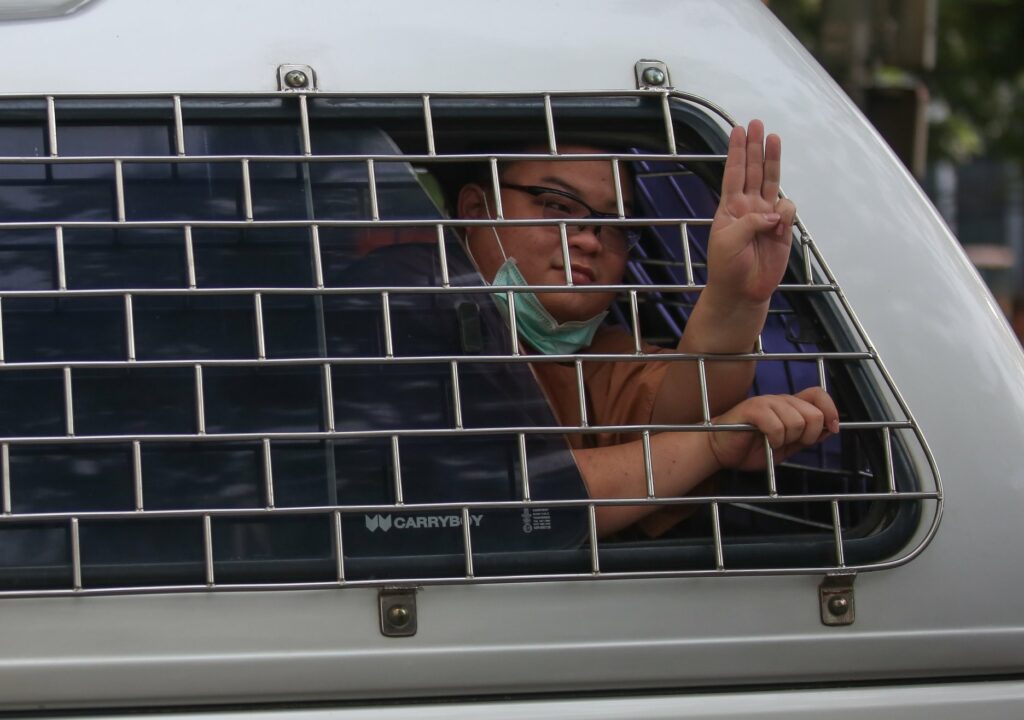 Parit in prison van heading to the Criminal Court
Parit in prison van heading to the Criminal Court
- The Court acquitted the “Bang Sao Thong Referendum” case, pointing out that distributing pamphlets did not violate the law.
On 30 Oct 2020, the Samut Prakan Provincial Court scheduled a date to read the verdict for the case involving the 12 democracy activists and trade union members, who distributed pamphlets encouraging people to vote against the referendum in Kheha Bang Phli Market, Samut Prakan province on 23 June 2016 prior to the referendum on the draft constitution.
The 12 people became defendants in the case of the violation of no. 12 of the NCPO order no. 3/2558 on a political gathering of more than 5 people and instigating unrest during the referendum period according to the Referendum Act B.E. 2559 (2016). Eight of them were also charged with not giving fingerprints, and two were charged with not showing ID cards. This case was transferred from the Military Court and took 4 years and 4 months before the Court verdict came out.
The Court acquitted all charges because the NCPO order no. 3/2558 had already been repealed and the distribution of campaign materials and the use of megaphones were merely a means of expression of opinions, not regarded as an offense under section 61 of the Referendum Act B.E. 2559 (2016). As for the refusal to give fingerprints, The CDR Announcement no. 25 had already been repealed, too. Lastly, Defendant no. 1-2, who were charged with not showing ID cards, were proven unguilty, as the plaintiff’s witnesses and evidence had no grounds.
